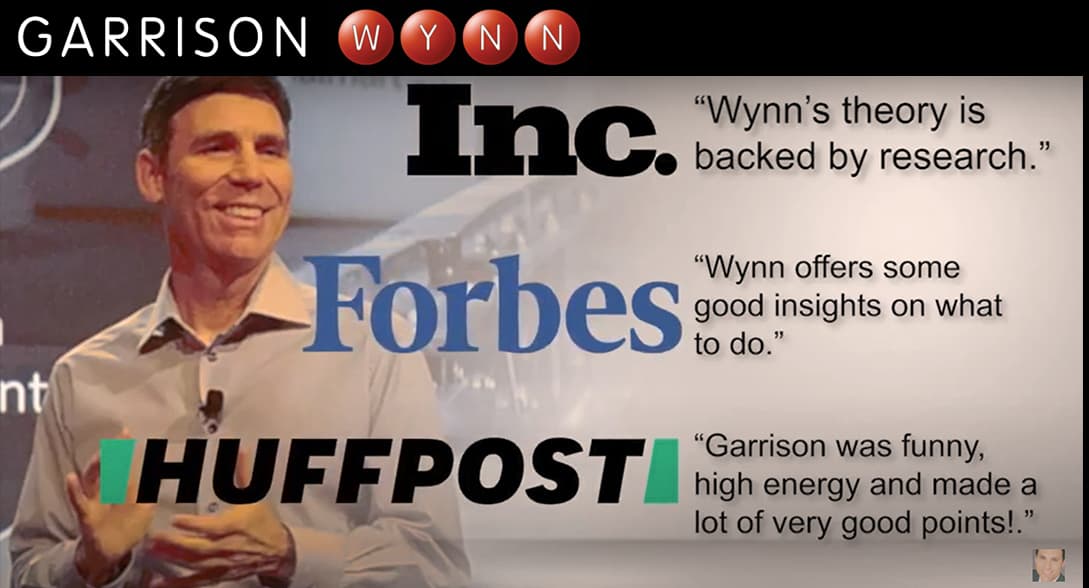Creating an effective plan for the future, improving employee performance and managing change are often the focus…
Continue readingSpeaking Like You Love The Audience
Straight to the point; if you do not engage your audience, your talent, knowledge, wisdom, looks, even celebrity only gives you limited buy-in. To maximize every ounce of your talent and be able to repeat it beyond any other way….Keep reading
Continue readingGuest Speaker Conference Room Setup and Event Planning Suggestions
Conference room setup tips from professional guest speaker Garrison Wynn. With over 22 years experience and working with over 90 meeting planners per year, Garrison has unique perspective you might find valuable.
Continue readingManaging Your Keynote Speaker
Before you call the Speaker: Planning
- Speakers often keep a busy schedule and travel a great deal. Arrange a conference call at a set date and time with the speaker’s office. This way, you are sure to have your speakers full attention for at least an hour without dealing with constant interruptions.
- Contact the speaker’s office at least three months in advance if possible. (Allow more time if your date is set in stone and your chosen speaker is in high demand.)
- Have a clear topic and purpose for the keynote. If you are unsure, a seasoned professional speaker can help narrow things down for you and create a program that will wow your audience and make you look good at the same time.
- Be able to describe your audience: demographics, job responsibilities, current strengths, weaknesses and issues of concern.
- Have dates, location and the desired duration of the program if possible. The more details you can get “set in stone” with the speaker directly, the better!
- Have a budget and be ready to discuss expenses such as airfare, lodging and meals depending on the structure of your agreement.
Securing a keynote speaker for your date
Some speakers will accept a temporary hold on their calendar for your event until you are ready to make a firm commitment. Others will require a contract and/or deposit before committing to speak at your event.
Preparing a keynote speaker for your event
- Many speakers will provide you with a pre-program questionnaire once the date is booked and a contract is signed. It is important to return these forms promptly and discuss any questions you may have.
- Book and confirm a hotel room for the speaker, preferably at the location of the event, and send them the confirmation. Guarantee late arrival for your speaker’s hotel room and check him in before he/she arrives. Check the room to make sure everything is in order. Arrange for direct billing to your organization. This eliminates paperwork for you after the event, and makes check-in and-out a painless experience.
- Most speakers prefer to book their own airfare and will arrange transportation to and from the airport. If you are handling these details, make sure their are no time conflicts with the speaker’s schedule and send them all confirmations.
- Arrange a conference call with the speaker as the event draws nearer to go over details and last minute questions.
- Let the speaker know of any functions you would like him or her to attend (time permitting), the dress code for the event and provide them with an event agenda.
The Speaker at the event
- Leave a message for your guest speaker to receive upon his/her check-in. Indicate your room number, or how he/she can get in touch with you when he/she arrives.
- Prepare the audio/video crew for a microphone check with the speaker.
- Make sure that the guest speaker’s introduction has been given to the person who will introduce him/her.
- Instruct the introducer to deliver the introduction exactly as it was prepared by the speaker.
- Ensure that the speaker’s name is spelled correctly on the printed program and on his/her name badge.
Hire A Funny Keynote Speaker To Boost Retention and Speaker Reviews
It is important to hire a funny keynote speaker, even when you are focused on content.
Content + Humor: A Full-on Fusion Boosts Your Meeting’s Success
You know your organization’s objectives for the meeting. You spend time and effort to create the perfect event to support those goals. And then a dry, boring speaker single-handedly makes sure that attendees carry away nothing of value… except maybe a few bottled waters.
In today’s work world, a funny speaker is crucial to your meeting’s success. Studies show that people acquire more information and are more likely to retain and implement what they hear if they laugh along the way. In recent years, advertisers, newscasters and educators have infused humor into their efforts to persuade, inform and instruct. They’ve realized that without original humor (not old, stale jokes), people just won’t tune in or pay close attention. Nothing against Walter Cronkite, but he just wasn’t funny– “and that’s the way it is!”
As we get busier and more distracted, it takes humor to grab an audience’s attention so the message can be delivered. Studies of college lecturers who use humor in the classroom indicate that humor positively affects attention, motivation and comprehension. Done right, humor also improves recall of the subject or idea being communicated. Combining good content with original humor is a must at today’s meetings.
Who hasn’t listened to some high-cost motivational speaker who wrote a fantastic book but who’s only halfway through the presentation before you realize the information would be really valuable if you could just stay awake for it? Who hasn’t checked the watch or phone as boredom sets in and been surprised to realize that 10 minutes was all the speaker needed to completely lose the audience?
Subjected to speakers like that, attendees who provide conference feedback will comment “I thought the information was good,” which is code for “The speaker was not!” When association members under age 45 are asked why they no longer attend the annual meeting in their industry, they often say, “Well, the speakers are boring and I can get that information online.” The speaker you choose for your event creates the impact and memorable experience you desire for your attendees. If studies show that effective teaching in college classrooms revolves around the connection established between the instructor and the student, then your event should be built around speakers who establish that connection and make the content memorable. Humor is key to both.
And yet, the combination of real business content and original humor is not always easy to find. Some speakers are mainly humorists who tell loads of funny stories with little relevance; other speakers who offer rock-solid content can really struggle to include humor that produces a laugh. Your best results will come from a speaker who understands that it’s not so much a balance of content and humor; it’s a full-on fusion of the two.
This kind of speaker uses funny stories that are on point; in fact, the humor exists to make the point. This kind of speaker makes sure that anecdotes and jokes provide a memorable context for information recall. There’s little comparison to speakers who rely on clownish humor that undercuts their authority. Frankly, silly doesn’t fly among VP types. Silly might attract attention but it doesn’t sell the message. It makes your event memorable for the wrong reasons.
It’s worth the search to find that speaker whose expert use of humor keeps your group engaged and taking notes on information they can use to forward their success. When your aim is to have people leave your event feeling informed and energized, forgoing the humor is no laughing matter.
“Comedy is truth–only faster. Things are funny because they’re true. If people relate, they retain.” — Garrison Wynn,
1 Studies from Bandes (1988), Bryant et al. (1979), Wandersee (1982), and Gorham & Christophel (1990), cited in Kher N, Molstad S, Donahue R, 1999: “Using humor in the college classroom to enhance teaching effectiveness in ‘dread courses,'” College Student Journal 33(3): 400. Available at https://findarticles.com/p/articles/mi_m0FCR/is_3_33/ai_62839448/, accessed April 22, 2011.
2 Conclusion reached in study by Hill (1988), cited in Kher, Molstad & Donahue (1999).
3 Pollio HR and Humphreys WL (1996): “What award-winning lecturers say about their teaching: It’s all about connection.” College Teaching 44, 101-106.
4 Kher, Molstad & Donahue (1999), citing study by Hill (1988).
Icebreakers for Meeting Planners and Facilitators
The days of one-liner jokes as ice breakers are gone, and there are many new creative ideas. The most popular are games that have participants reveal something personal about themselves, or which encourage participants to get to know each other personally. The idea is that more than just having fun, the ice breaker will truly help to create group cohesion based on trust and understanding.
Continue readingGuest Speaker Room Setup | Make The Most of Your Guest Speaker
Make the most of your guest speaker with careful attention to these details before your event
Continue readingChoosing a Guest Speaker
Choosing the right guest speaker to meet all your objectives can be a stressful task. This articles takes you through the process of choosing a guest speaker.
Continue reading







